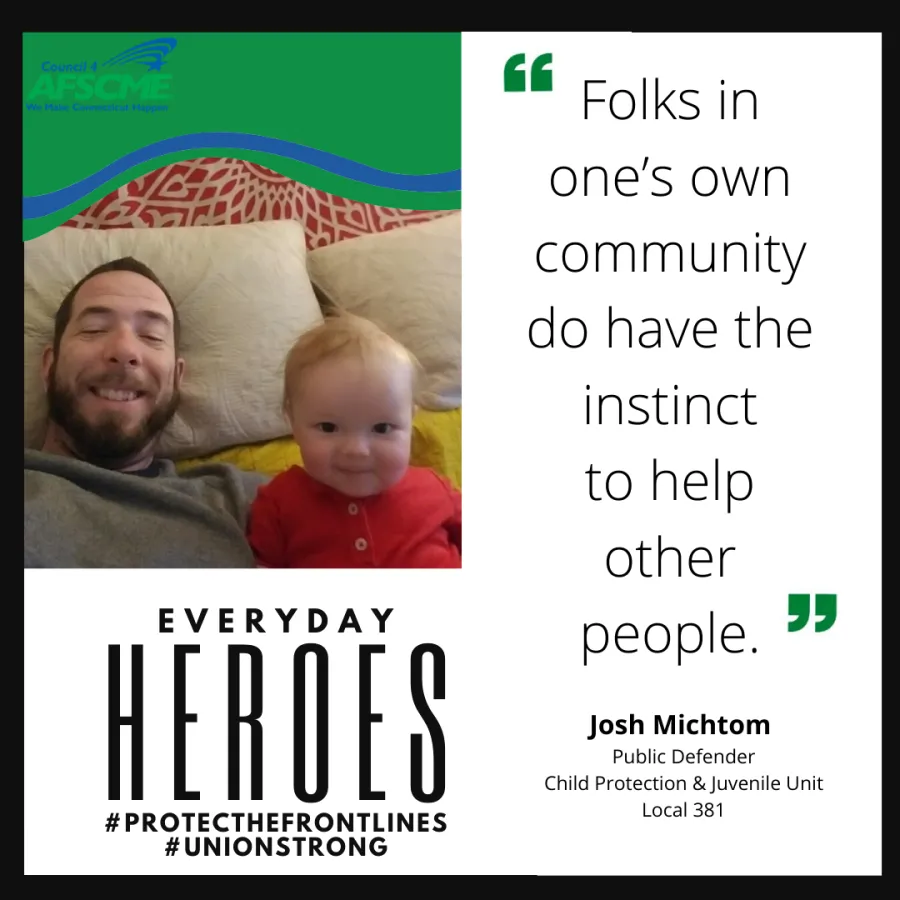Public Defender Redefines Community and Public Service

For Josh Michtom, member of Local 381 (State Public Defenders) and Hartford City Councilman - the saying, “All in a day’s work,” carries a lot of weight.
On a recent Wednesday, he coordinated the delivery of 75 lunches donated by the Wahlburgers restaurant to a drop-in resource center in the North End of Hartford, unloaded a large grocery run and delivered food items for Hartford Mutual Aid, dropped off homemade bread for his city council aides, and discussed renters rights at a school lunch pick-up location in the Parkville neighborhood – all before dinner time.
For Michtom, these full days are defined as more of a labor of love than actual work. “I love my city and I love being out and about talking to people and helping them solve problems,” he explained.
As a public defender and member of AFSMCE Local 381 (State Public Defenders), Michtom works in the Child Protection and Juvenile Unit of the state’s Division of Public Defender Services. His role includes overseeing and training private lawyers who represent parents and children in Department of Children and Families (DCF) neglect cases. He also takes on individual cases and appeals.
“People think of us as doing criminal work, which is the vast majority of what we do, but we also represent kids charged with delinquencies and parents whom the state has taken kids away,” he said. “People also talk a lot about abuse [in relation to DCF], but far more of the cases are [issues of] neglect.”
What Michtom brings to the table are not only specialized skills and empathy, but an understanding of the often complex and precarious situations his clients find themselves in. He sees most of the life circumstances of families involved with DCF as boiling down to one common factor: poverty.
“So much of it is really people in poverty and contending with problems that radiate out from not having stability of housing or income or food or any of that stuff,” he added.
The public defenders union was formed in 2017 and won their first collective bargaining agreement last year. Although his Local 381 is still in its relative infancy, Michtom’s ties to labor already existed. He previously worked as a grievance officer for the New York Hotel Trades Council, Local 6 (now part of UNITE HERE) for three years.
“It’s instinctive for me that if there’s the option to be in the union, I’m going to be in the union,” he said. “There’s a sense that if something seems unfair or if there is a complaint, that there is a clear system,” he explained. “I have always been pretty happy with my workplace situation, but know now that we can raise up [concerns] so that’s a good thing.”
With the court system limited to emergency hearings due to COVID-19, a lot of Michtom’s daytime work has slowed down, but he has not eased up. His community work has ramped up significantly partly due to his support of relief efforts conducted through Hartford Mutual Aid (HMA).
HMA is a network made up of volunteers who do grocery runs, package food and supplies, and deliver resources to different neighborhoods where other volunteers serve as distribution hubs. His wife, Constanza Segovia, and others help connect donations and supplies with the demand, which has mostly surfaced by word of mouth.
As the owner of a bus normally used by a brass band he is a part of that is on hiatus, Michtom makes weekly trips to pick up leftover food pantry items and deliver to a Mutual Aid volunteer in the South End for disbursement. The bus has been reconfigured to include messaging about renters’ rights, including an Executive Order he lobbied for.
“I’ve been driving around with information written in chalk on my bus and with the loudspeaker playing an announcement in English and Spanish about what people’s rights are.”
When the COVID-19 pandemic started and layoffs and furloughs ensued, he and another Hartford city councilor, Wildaliz Bermudez, were discussing how people would be able to pay their rent. They drafted legislation to create a 90-day grace period for renters if they paid a small amount up front and wrote to their landlord about their hardship.
His proposal was shared with state representatives and Hartford Mayor Luke Bronin who, along with several other mayors, asked Gov. Lamont to implement it. Two days after the letter was delivered, the Governor signed an Executive Order implementing much of what Michtom had initially proposed.
Since campaigning as a city councilor and winning the seat last year, Michtom has learned a lot about his Hartford community, especially during the coronavirus crisis.
“What I’m seeing really clearly is how much people, folks in one’s own community, have the instinct to help other people,” he said. “People who don’t really have much at all are stepping up in Hartford in a lot of ways. It gives me some hope for some post-pandemic organizing and thinking differently about how we operate economically and how we look out for one another.”
*Mutual Aid Hartford accepts donations to pay for groceries, diapers, and other necessities through their Venmo account - @mutualaidhartford. Those who have skills to offer, or non-monetary donations, can email [email protected].
